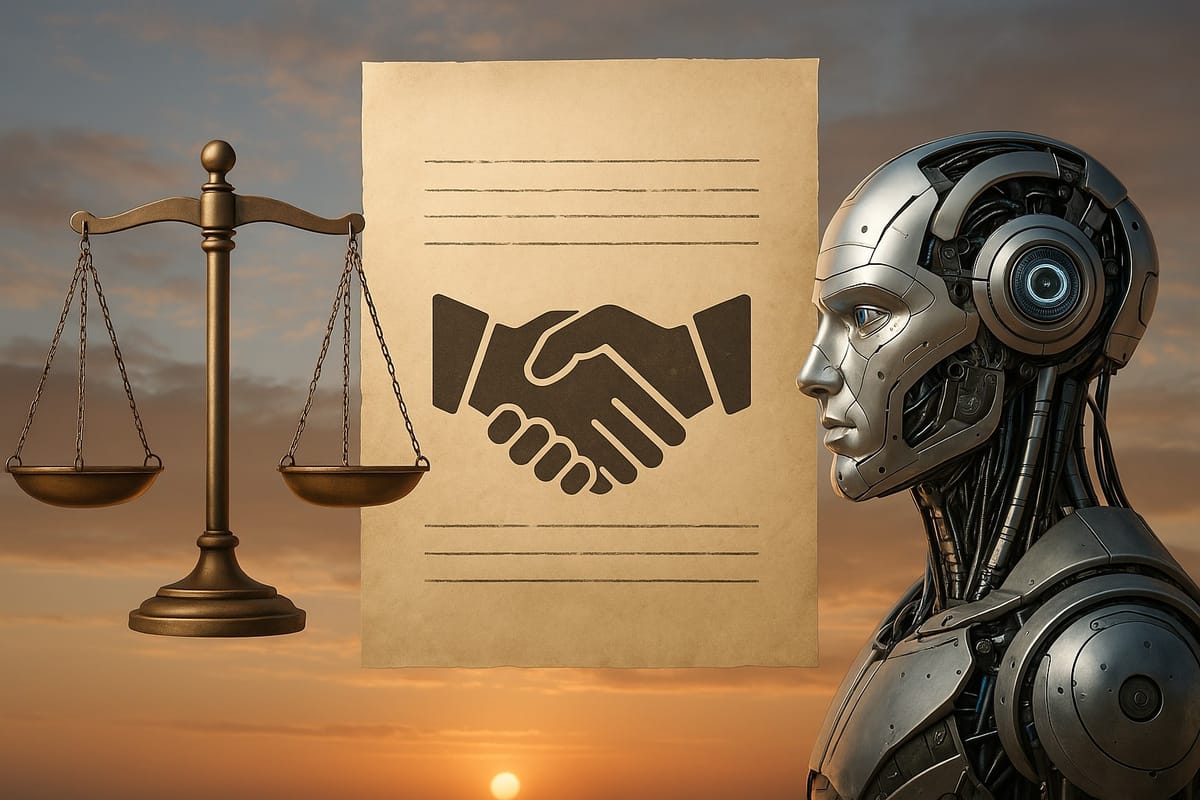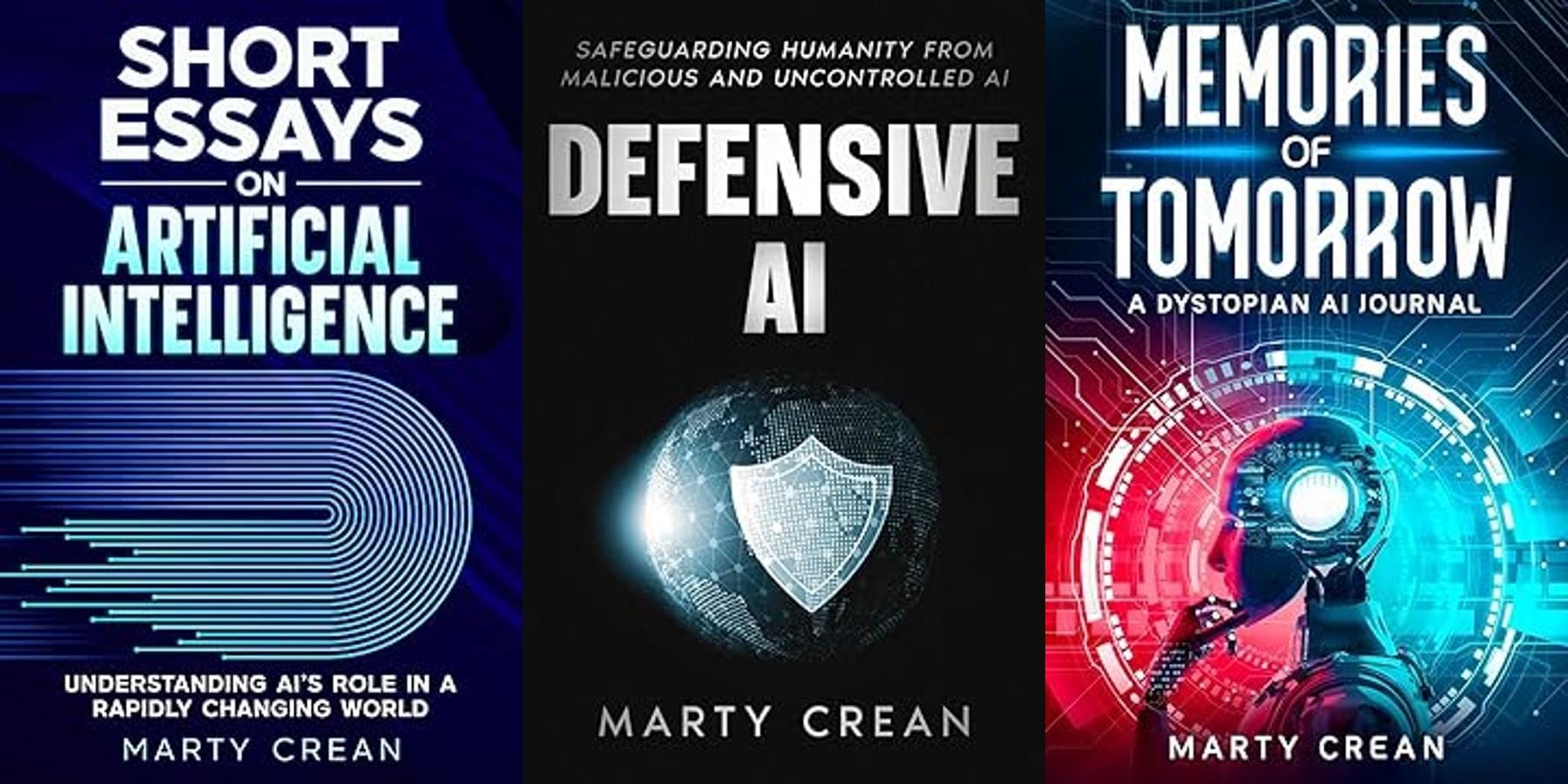AI Will Require Rewriting of Social Contracts

This post is also available as a podcast if you prefer to listen on the go or enjoy an audio format:
As artificial intelligence becomes further integrated into society, the need to fundamentally reimagine our traditional social contracts becomes increasingly evident. These longstanding agreements, forged in eras that could not account for autonomous systems, predictive algorithms, and data-driven governance structures, are now being rapidly transformed by AI. This transformation demands not just reflection but thoughtful reform.
The concept of a social contract has historically presumed shared human agency, with people consenting to certain limitations on their freedoms in exchange for societal protection and benefits. However, AI systems complicate this foundational premise by introducing non-human actors that can cause demonstrable harm to individuals or communities. As algorithms determine who receives job opportunities or qualifies for parole, society must grapple with profound questions about what fairness, informed consent, and justice mean in a world where machines increasingly mediate human outcomes.
Consider the growing use of predictive policing, where sophisticated algorithms analyze historical crime data to identify high-risk areas for patrol allocation. While this approach may improve operational efficiency, it often reinforces existing societal biases and disproportionately targets already marginalized communities, creating a self-fulfilling prophecy of increased arrests in over-policed neighborhoods. Similarly, hiring algorithms trained on historically biased datasets may systematically filter out qualified applicants from underrepresented groups despite their technical qualifications or potential contributions. These real-world applications demonstrate how AI, even when designed with the best intentions, can unintentionally undermine social equity and perpetuate systemic injustices, making it imperative to revise the rules governing its development and deployment.
The implications extend far beyond these examples. In healthcare, AI systems might prioritize patient treatment based on cost-effectiveness rather than individual needs. In the financial services industry, algorithmic credit scoring may exclude worthy borrowers from traditionally underserved communities. Automated systems may disproportionately censor certain political viewpoints or cultural expressions in content moderation. Each instance represents a reshaping of power dynamics that was never explicitly agreed to by those most affected.
Integrating AI into decision-making processes raises profound ethical questions that our current social contracts are ill-equipped to address. This highlights the growing need for robust AI governance structures that safeguard human dignity and autonomy in an increasingly automated world. Who bears responsibility when an AI system causes demonstrable harm to individuals or communities? How can we ensure meaningful transparency in algorithmic decisions involving complex mathematical models beyond most people's comprehension? Should humans always retain the right to appeal or override AI-generated choices that affect their fundamental rights and opportunities? These questions highlight the need for such governance structures.
The challenge is particularly acute because AI development often outpaces the development of regulatory frameworks. When society recognizes a harmful pattern in algorithmic decision-making, thousands or millions of people may have already been affected. Traditional remedies, such as litigation or legislative reform, operate too slowly to provide meaningful protection in the face of rapidly evolving technologies. This reality demands a more proactive approach to establishing the ethical boundaries within which AI should operate.
A revised social contract for the AI era must incorporate several essential elements to safeguard human well-being while fostering beneficial innovation. Transparency must be a fundamental principle, ensuring that people have a meaningful understanding of how consequential decisions affecting their lives are being made. This doesn't necessarily mean exposing proprietary code but rather providing intelligible explanations of the factors and logic that influence outcomes.
Accountability frameworks must clearly define who is responsible for decisions made with the influence of AI systems. Whether developers or oversight bodies, someone must be held accountable for algorithmic harm, just as they would for human-caused injuries. Without clear lines of accountability, those harmed by AI systems will have no meaningful recourse.
Inclusive development practices must ensure that traditionally marginalized voices are included in the creation and regulation of AI technologies. When diverse perspectives shape technological development from its earliest stages, the resulting systems are more likely to serve the needs of all community members rather than just the privileged few. This requires deliberate effort to overcome existing patterns of exclusion in technological development.
Protection of fundamental rights must extend to the digital realm, with particular attention to data privacy, informed consent, and the right to explanation. People should maintain meaningful control over their personal information and understand how it contributes to decisions that affect them. When algorithmic systems make consequential determinations about individuals, those people deserve to know the basis for such judgments.
Several practical strategies warrant serious consideration to address the risks posed by AI while supporting healthier societal evolution. Mandatory AI Impact Assessments would require organizations to thoroughly evaluate and publicly disclose the potential societal consequences of their AI tools before deployment. Similar to environmental impact statements for construction projects, these assessments would require developers to consider possible adverse side effects before commencing work.
Independent algorithmic audits by qualified third parties would regularly examine high-impact AI systems for bias, fairness, and compliance with ethical standards. Such audits help identify problematic patterns in algorithmic behavior that might not be apparent to internal teams with vested interests in technology’s success.
Establishing AI oversight teams would create dedicated public advocates who could mediate between ordinary citizens and the institutions deploying AI technologies. These neutral intermediaries would help individuals navigate complex technological systems and advocate for fair treatment when algorithmic decisions seem questionable or harmful.
Comprehensive digital literacy programs equip citizens with the knowledge to understand and thoughtfully question the AI decisions that affect their lives. Without basic technological literacy, meaningful consent becomes impossible, and power inevitably concentrates in the hands of technical experts. Education must extend beyond technical understanding to include critical thinking about the societal implications of automated decision-making.
Ultimately, legal frameworks must become more adaptable, evolving rapidly to address emerging challenges while striking a balance between fostering beneficial innovation and safeguarding vulnerable populations. This requires new legislative approaches that establish broad principles while allowing for flexible implementation as technologies evolve.
Integrating AI into society represents far more than a mere technical shift. It constitutes a transformation of how we live, interact, and govern ourselves. Suppose we fail to update our social contracts thoughtfully to account for this transformation. In that case, we risk entrenching existing inequalities, further eroding public trust in institutions, and systematically disempowering individuals in the face of algorithmic authority.
However, if approached with wisdom and foresight, this technological revolution presents a unique opportunity to forge a more just and inclusive society that harnesses the benefits of AI while upholding essential human values. The responsibility for guiding this transformation falls on all of us—technologists who build these systems, policymakers who establish their boundaries, educators who prepare the public to engage with them thoughtfully, and citizens who must demand accountability from all institutions that deploy algorithmic tools shaping our collective future.
By recognizing how AI challenges our traditional notions of fairness, autonomy, and social responsibility, we can initiate the challenging yet necessary work of developing new frameworks for humans in an age increasingly defined by artificial intelligence. The social contracts that emerge from this process will determine whether AI ultimately serves as a force for greater human empowerment or becomes a tool that undermines the very foundations of democratic society. The choice is ours, but the window for shaping these outcomes grows narrower as AI systems become more deeply embedded in our social fabric.
BearNetAI, LLC | © 2024, 2025 All Rights Reserved
Books by the Author:

Categories: AI Ethics, Technology and Society, Governance and Policy, Social Impact, Human Rights
Glossary of AI Terms Used in this Post
Accountability Gap: The lack of clarity around who is responsible when AI systems cause harm or fail.
Algorithmic Bias: Systematic and repeatable errors in a computer system that result in unfair outcomes, such as favoring one group over others.
Autonomous System: A machine or software that can perform tasks or make decisions with minimal human intervention.
Digital Literacy: The ability to understand, use, and critically evaluate technology, including AI systems.
Explainability: The degree to which a human can understand the reasons behind an AI system's output or decision.
Human-in-the-Loop: A design approach that includes human oversight or intervention in automated decision-making processes.
Predictive Policing: The use of AI and data analytics to forecast where crimes are likely to occur, often based on historical crime data.
Social Contract: The implicit agreement among members of a society to cooperate for mutual social benefits, now challenged by the rise of artificial intelligence.
Transparency: The principle that AI systems should be open to scrutiny allows people to understand how and why decisions are made.
Value Alignment: The process of designing AI systems to act in ways consistent with human ethical values and societal norms.
Citations:
Binns, R. (2018). Algorithmic Accountability and Transparency in the Age of Big Data. Philosophical Transactions of the Royal Society A.
Cath, C. (2018). Governing Artificial Intelligence: Ethical, Legal and Technical Opportunities and Challenges. Philosophical Transactions of the Royal Society A.
Crawford, K. (2021). Atlas of AI: Power, Politics, and the Planetary Costs of Artificial Intelligence. Yale University Press.
Eubanks, V. (2018). Automating Inequality: How High-Tech Tools Profile, Police, and Punish the Poor. St. Martin’s Press.
Pasquale, F. (2015). The Black Box Society: The Secret Algorithms That Control Money and Information. Harvard University Press.
Rahwan, I., Cebrian, M., Obradovich, N., Bongard, J., Bonnefon, J. F., Breazeal, C., ... & Wellman, M. (2019). Machine Behavior. Nature, 568(7753), 477-486.
Tufekci, Z. (2015). Algorithmic Harms Beyond Facebook and Google: Emergent Challenges of Computational Agency. Colorado Technology Law Journal, 13(203), 203-218.
LinkedIn BlueskySignal: bearnetai.28